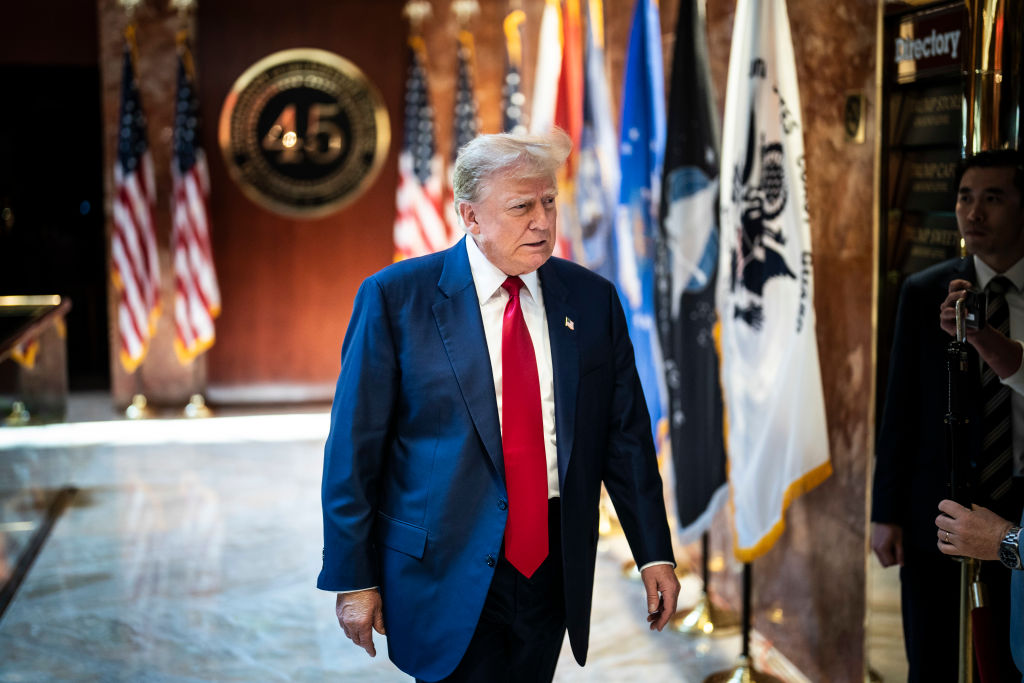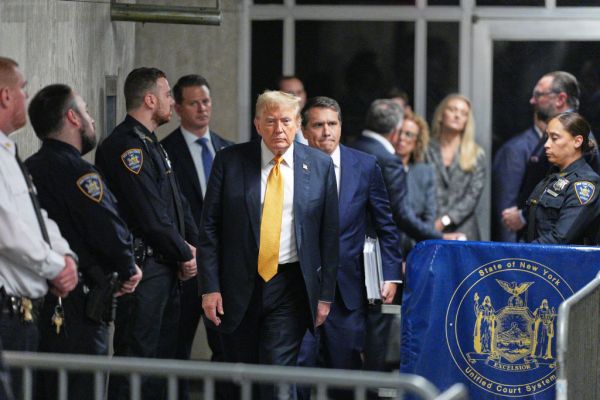Hello and happy Sunday. A couple of weeks ago, Kevin had a great piece on what’s wrong with comedy these days. He cited a litany of problems, some specific to political humor, and noted, “And then there’s Donald Trump, whose main challenge to comedians is that he already is a caricature whose grotesquery is difficult to exaggerate.”
How is a comedian supposed to satirize the news that the former president of the United States has been convicted on 34 felony counts for falsifying records related to his hush-money payments to a pornographic actress a month before the 2016 election? How do you crack a joke about how he faces a sentencing hearing set for four days before the Republican National Convention, where he will be formally nominated to run in the 2024 election? Or laugh at the news that Trump raised $52.8 million to assist him in that run after the verdict was announced?
Here at The Dispatch, we sprang into action late Thursday afternoon when the jury returned to render its verdict. David and Sarah recorded an emergency Advisory Opinions episode, which you can watch or listen to. They answer some basic questions—Will Trump go to jail? Can he vote for himself in November? On what grounds can he appeal?—and also discuss how voters might react.
I’m not sure Sarah got much sleep, because after she was done recording, she and Michael Warren rushed out a bonus edition of The Collision. In it, they discussed these and other fun questions, including what rights Trump loses as a convicted felon, and what would happen if he were sentenced to prison (however unlikely) and then elected president.
Even though it seems ridiculous on a number of levels that a former and potentially future president can raise millions of dollars in response to being convicted for covering up hush-money payments that were themselves an attempt to cover up scandalous behavior, the fact remains that the entire case itself was controversial. Manhattan District Attorney Alvin Bragg used a novel legal theory to charge Trump in the first place. As we explained in The Morning Dispatch Friday:
The problem for Bragg was that the two-year statute of limitations had expired on the misdemeanor charge of falsification of business records. But, under New York state law, if the defendant is alleged to have cooked the books in an effort to conceal another crime, that’s a felony on which the statute of limitations had not run out.
Nick spends a good deal of time addressing that issue in his Friday Boiling Frogs, noting that bringing (forgive me) trumped-up charges against someone of Trump’s stature invites disaster. He writes, “There’s no better way to cultivate the sort of contempt for institutions on which Trumpy populism thrives than for its opponents to treat respect for civic norms as conditional.” At the same time, he’s not moved by any arguments Trump supporters are making on his behalf, notably that he is some kind of martyr on par with Alexei Navalny, Aleksandr Solzhenitsyn, or (we kid you not), Jesus Christ. He concludes: “I think the only thing to celebrate about the verdict in the Bragg case is that it’ll make a Trump victory in November a bit more embarrassing for the United States.”
Jonah has similar conflicted feelings about the trial and verdict, and he addresses those in the G-File. He agrees that Bragg’s prosecution was problematic from the get-go. But he feels no sympathy for Trump: “I have no problem with reasonable criticism of this case and the verdict. Why would I? I agree with much of it. Where I part company is with the idea that this proves Donald Trump was ‘right’ about the system. He’s like a human monkey wrench hurling himself into the gears of the system and then, when mangled by it, crying about how he’s a victim and that his victimhood proves the system never worked.”
The live-action drama that is the 2024 election did not need any more storylines or subplots, but here we are. We’ll be following any further developments and I’ll share them with you here. Thanks for reading—and please note that we did cover a few other stories this week. Check them out below.
Say you’re an incumbent president running for reelection. Your approval rating is hovering around 40 percent and you’re trailing your challenger in most swing states. Your one saving grace is that a lot of people—important people—on the other side don’t like your challenger either. Would it make sense to maybe make nice with that challenger’s critics? It probably would. But as John McCormack writes this week in a well-reported piece, Joe Biden’s campaign has not even reached out to prominent Trump critics like Chris Christie or Mike Pence. Nikki Haley didn’t get a call when she dropped out of the GOP primary (and she has now endorsed Trump). John describes it as “one signal that Biden and other high-ranking Democrats are more concerned about shoring up support in their own base than they are winning over disaffected Republicans.” The other signals? A softening of support for Israel and a lack of action on the border crisis. In an interview, Mike Pence told John: “Joe Biden won his party’s nomination in 2020, but Bernie Sanders won the party.”
Speaking of disaffected Republicans, Matthew J. Franck makes the case that voting for neither Trump nor Biden in November is a perfectly logical thing to do. He revisits the 2016 election and explains why he couldn’t bring himself to vote for Hillary Clinton or Donald Trump, and why in 2020 he couldn’t vote for Joe Biden or Trump. And nothing since has changed his mind. “The year 2025, we can presumptively say now, will begin with the inauguration of a truly terrible president, and it will be a rocky four years from then on,” he writes. “Whichever man is in the Oval Office, I will be able to say, with grim satisfaction, that I have nothing invested in him and my conscience is clear.” (Don’t miss Nick’s response in Boiling Frogs, where he argues that defeating Trump is important to maintaining our constitutional order.)
A couple of weeks ago, Judge Aileen Cannon unsealed a document in Donald Trump’s classified documents case that prompted an unfounded conspiracy theory that the FBI was prepared to assassinate Donald Trump. (If more recent events have overwritten that memory in your internal hard drive, Michael Warren’s piece from that week is a good refresher.) Those baseless claims were spread not just by right-wing trolls online, but also by Rep. Marjorie Taylor Greene. In Wanderland (🔒), Kevin takes note of Greene’s comments and reminds us that it hasn’t been that long since House Republicans actually expelled one of their own—George Santos—and for a much lesser offense than Greene’s dangerous lie. “Greene is not the most significant of the parties who have worked to spread the wild lie that the Biden administration attempted to assassinate Donald Trump during the search of Mar-a-Lago,” Kevin writes. “Donald Trump is the most important of the liars. Julie Kelly of RealClear (ha!) Investigations is another. But Greene is a member of Congress, not a social media troll. And while she is not the only member of Congress to traffic in this nonsense, she is the worst offender.”
And here’s the best of the rest:
- Danielle Pletka has some choice words for the International Criminal Court and Prosecutor Karim Ahmad Khan for seeking indictments against Israeli Prime Minister Benjamin Netanyahu and Defense Minister Yoav Gallant. The United States and Israel are not parties to the ICC, and the potential indictments threaten to undermine the court’s existence.
- The death of Iranian President Ebrahim Raisi in mid-May creates questions about who might succeed 85-year-old Supreme Leader Ayatollah Ali Khamenei. Reporting from Tel Aviv, Charlotte runs through a list of possibilities, including rule by council.
- The Boy Scouts of America just changed their name to Scouting America in a gesture toward inclusivity. Philip D. Bunn argues that the organization has lost more than its name: “In striving to be all things to all people, however, Scouting has failed to make a case for its own continued existence—and is on the decline.”
- If our own political drama is not sordid enough for you, you’re probably pretty excited for the new season of House of the Dragon, the Game of Thrones prequel looking at the decline of the Targaryen dynasty. Samuel Kronen Looks back at the most captivating character of Season 1.
- Last but not least: It was a good week for the pods even before the aforementioned live emergency Advisory Opinions episode. On The Remnant, Jonah welcomes Caitlin Flanagan of The Atlantic for a conversation that highlights the failures of the modern left and touches on a few other topics. On the Dispatch Podcast, Jamie gets wonky about inflation, the tax code, and the economics of defending Taiwan with Douglas Holtz-Eakin of the American Action Forum. And for a nice legal palate cleanser, nerd out to Sarah and David’s AO interview with Yale Law professor Akhil Reed Amar on unenumerated rights.










Please note that we at The Dispatch hold ourselves, our work, and our commenters to a higher standard than other places on the internet. We welcome comments that foster genuine debate or discussion—including comments critical of us or our work—but responses that include ad hominem attacks on fellow Dispatch members or are intended to stoke fear and anger may be moderated.
With your membership, you only have the ability to comment on The Morning Dispatch articles. Consider upgrading to join the conversation everywhere.